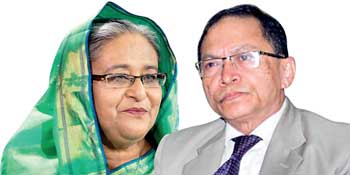Reply To:
Name - Reply Comment
Last Updated : 2024-04-19 09:49:00
Bangladesh’s judicial independence again at stake
 With the forced exit of Bangladesh Supreme Court Chief Justice, Surendra Kumar Sinha, over the 16th Constitutional Amendment (16A) which gives parliament power to sack a higher court judge with a two-thirds majority, the issue of the independence of the judiciary in Bangladesh has come to the fore once again.
With the forced exit of Bangladesh Supreme Court Chief Justice, Surendra Kumar Sinha, over the 16th Constitutional Amendment (16A) which gives parliament power to sack a higher court judge with a two-thirds majority, the issue of the independence of the judiciary in Bangladesh has come to the fore once again.
Chief Justice Sinha was clearly forced to take a month’s leave and go off to Australia so that the Awami League Government headed by Sheikh Hasina could appoint a new Chief Justice and get Sinha’s earlier judgment nullifying the 16A, reversed.
 The 16A, Sheikh Hasina’s idea, was passed by parliament on September 17, 2014, when the main opposition party, the Bangladesh Nationalist Party (BNP) headed by Khaleda Zia, had no representation in parliament. The BNP had boycotted the January 2014 parliamentary elections.
The 16A, Sheikh Hasina’s idea, was passed by parliament on September 17, 2014, when the main opposition party, the Bangladesh Nationalist Party (BNP) headed by Khaleda Zia, had no representation in parliament. The BNP had boycotted the January 2014 parliamentary elections.
Prior to 16A, higher court judges could be removed only by the Supreme Judicial Council (SJC). On November 5, 2014, nine Supreme Court lawyers went to the High Court to get 16A nullified on the grounds that it shackles the judiciary and makes mockery of the principle of Separation of Powers.
The High Court sent a notice to the government asking why 16A cannot be annulled. In May 2016, a Special High Court annulled 16A. On May 8, 2017, the government went on appeal against this to the Supreme Court, which headed by Chief Justice Sinha, unanimously rejected the State’s appeal on July 3.
The system that has been in place is that the country’s president appoints judges in consultation with the Chief Justice. But the appointing and dismissing authority in the case of the lower judiciary has been retained by the Law and Home Ministries
While the verdict was a blow to the power being enjoyed by Prime Minister Hasina and her government, Chief Justice Sinha’s remarks were even more annoying. These gave rise to the fear that he might undermine her power further, if left to his devices.
Sinha warned the government, albeit indirectly, that the judiciary could send a Prime Minister home as the Pakistan Supreme Court did in the case of Premier Nawaz Sharif. But indicating that the court would not act in haste on such matters, Sinha added: “We have been patient. We are keeping patience. We are only saying we have to be more mature.”
Sinha also questioned the competence of MPs to sit in judgment over judges and asked the Attorney General how a party system which has no faith in its own MPs and has to use the whip to prevent them from falling out of line while voting, can have confidence that MPs would decide on the fate of a judge on merits. The Chief Justice also complained that the government had taken way the lower courts from the purview of the Supreme Court. “I have no power over 80% of the lower courts,” he remarked. In the Masdar Hossain case on the Separation of the Judiciary from the Executive, Sinha had pointed to the inequity involved in the government’s directive that a lower court judge accused of misdeeds would be absorbed by the Justice Ministry. The Chief Justice felt that this was nothing but a way of shielding undesirable lower court judges. Judges of the lower courts are appointed, not by the Supreme Court, but by the Ministries of Law and Home, and it is these bodies which have the power to sack them, not the Supreme Court. Writing to The Daily Star on March 10, 2014, Prof. Rafiqul Islam pointed out that Art 22 of the Constitution enjoins the Separation of Powers, but this provision has been observed more in the breach.
Masdar Hossain, a lower court judge, had gone to court to get the lower courts separated from the Executive. In 1999, the Supreme Court issued twelve directives to give effect to its ruling separating the lower Judiciary from the Executive. But these directives were not implemented. In 2007, an Interim Government separated the entire Judiciary from the Executive. But again because of the transience of the Interim Government, this was not implemented.
The system that has been in place is that the country’s president appoints judges in consultation with the Chief Justice. But the appointing and dismissing authority in the case of the lower judiciary has been retained by the Law and Home Ministries.
According to Prof. Rafiqul Islam, the lower judiciary and the Public Prosecutors Office have been thoroughly politicized since the promulgation of Bangladesh’s first Constitution in 1972.
Politically-motivated cases are filed in thousands, and cases are also withdrawn on political grounds. He points out that between 2009 and 2014, at least 7,177 politically-motivated cases were asked to be withdrawn. The Code of Conduct for the lower courts was promulgated in 1988, but it is rarely followed. The long-standing demand for a Judicial Service Commission to appoint, discipline and sack lower court judges is yet to be met.
The issue has been made worse by Sinha’s unwarranted remarks about the applicability of the Nawaz Sharif case to Bangladesh
It is against the background of this decades-long tug-of-war between the Executive and the Judiciary that current standoff between the government and Chief Justice Sinha has to be seen. The issue has been made worse by Sinha’s unwarranted remarks about the applicability of the Nawaz Sharif case to Bangladesh and the role of Sheikh Mujibur Rahman in the independence struggle of Bangladesh.
 Sinha had damaged the ruling Awami League’s Unique Selling Proposition (USP) by saying the credit for winning freedom for Bangladesh could not be given to one individual. Although the name of Sheikh Mujib, Awami League founder-leader and Father of the Nation, was not mentioned, the allusion to him was unmistakable.
Sinha had damaged the ruling Awami League’s Unique Selling Proposition (USP) by saying the credit for winning freedom for Bangladesh could not be given to one individual. Although the name of Sheikh Mujib, Awami League founder-leader and Father of the Nation, was not mentioned, the allusion to him was unmistakable.
Sinha’s remark hurts Hasina personally as she is Sheikh Mujib’s daughter and derives her political legitimacy from her father. However, according to sources in Bangladesh, Hasina did not want to remove Sinha outright. She is said to have suggested that he feigns illness, takes a month’s leave and goes off to Australia. Sinha did agree to this, but reluctantly, as the opposition BNP was backing him.
Sensing political machinations, the government sent emissaries to Sinha to persuade him to leave without a fuss. But when this did not prove effective, a government agency levelled eleven charges against him, including money laundering and moral lapses. Sinha’s colleagues in the Supreme Court met him to get his side of the story, but apparently the fellow judges were not satisfied with his responses. Meanwhile, the government appointed Justice Abdul Wahab Miah as Acting Chief Justice. He is the new power centre in the judiciary.
An angry Sinha met the media as he was leaving for the airport to fly to Australia, and told them that he was not ill and that he was leaving because he was disappointed at the turn of events.
However, a strange incident happened at the Dhaka airport, according to journalistic sources in Bangladesh. While Sinha was allowed to board the aircraft, the Bangladesh immigration denied permission to his wife. Whether or not Sinha will be allowed to come back to Bangladesh is a matter of speculation. With the BNP readying itself to contest the next parliamentary elections in January 2019, Sinha, the fighter for the independent judiciary, could well be one of BNP’s mascots in the run up to the poll.

Add comment
Comments will be edited (grammar, spelling and slang) and authorized at the discretion of Daily Mirror online. The website also has the right not to publish selected comments.
Reply To:
Name - Reply Comment
On March 26, a couple arriving from Thailand was arrested with 88 live animal
According to villagers from Naula-Moragolla out of 105 families 80 can afford
Is the situation in Sri Lanka so grim that locals harbour hope that they coul
A recent post on social media revealed that three purple-faced langurs near t

10 Apr 2024
09 Apr 2024